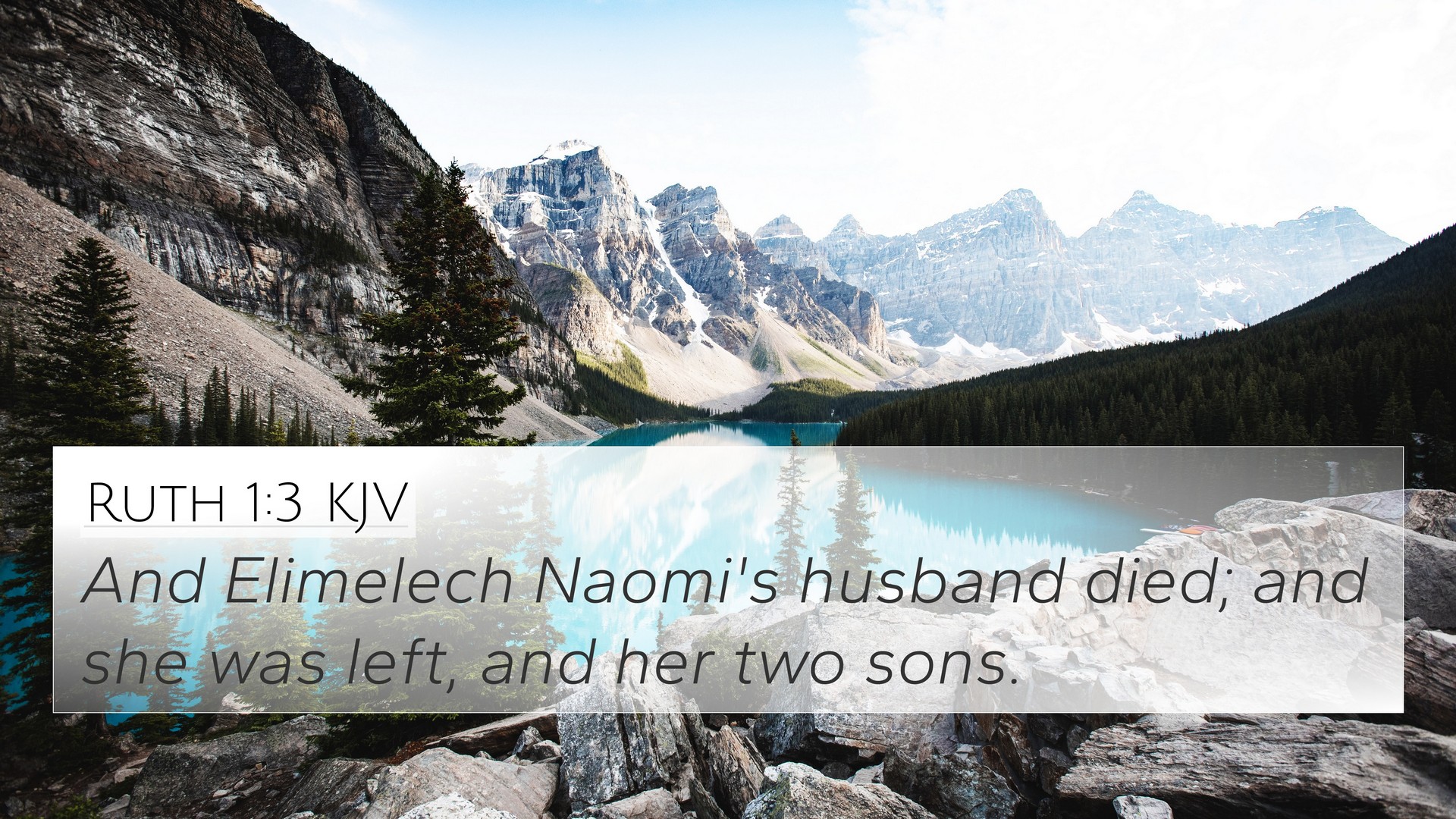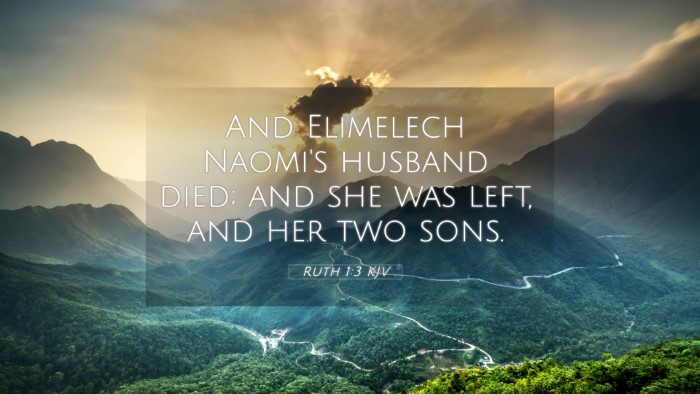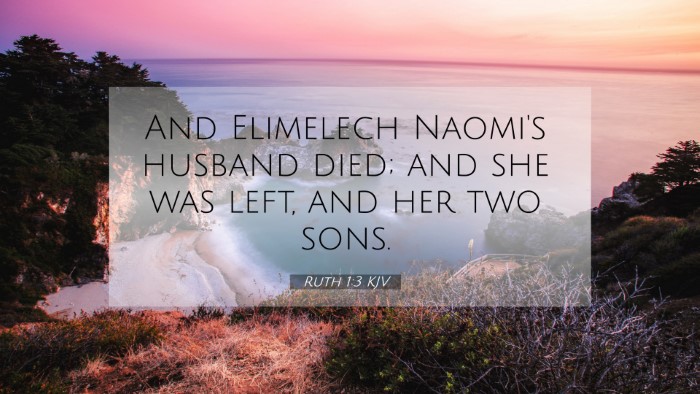Old Testament
Genesis Exodus Leviticus Numbers Deuteronomy Joshua Judges Ruth 1 Samuel 2 Samuel 1 Kings 2 Kings 1 Chronicles 2 Chronicles Ezra Nehemiah Esther Job Psalms Proverbs Ecclesiastes Song of Solomon Isaiah Jeremiah Lamentations Ezekiel Daniel Hosea Joel Amos Obadiah Jonah Micah Nahum Habakkuk Zephaniah Haggai Zechariah MalachiRuth 1:3 Similar Verses
Ruth 1:3 Cross References
And Elimelech Naomi's husband died; and she was left, and her two sons.
Uncover the Rich Themes and Topics of This Bible Verse
Listed below are the Bible themes associated with Ruth 1:3. We invite you to explore each theme to gain deeper insights into the Scriptures.
Ruth 1:3 Cross Reference Verses
This section features a detailed cross-reference designed to enrich your understanding of the Scriptures. Below, you will find carefully selected verses that echo the themes and teachings related to Ruth 1:3 KJV. Click on any image to explore detailed analyses of related Bible verses and uncover deeper theological insights.

Psalms 34:19 (KJV) »
Many are the afflictions of the righteous: but the LORD delivereth him out of them all.

Hebrews 12:10 (KJV) »
For they verily for a few days chastened us after their own pleasure; but he for our profit, that we might be partakers of his holiness.
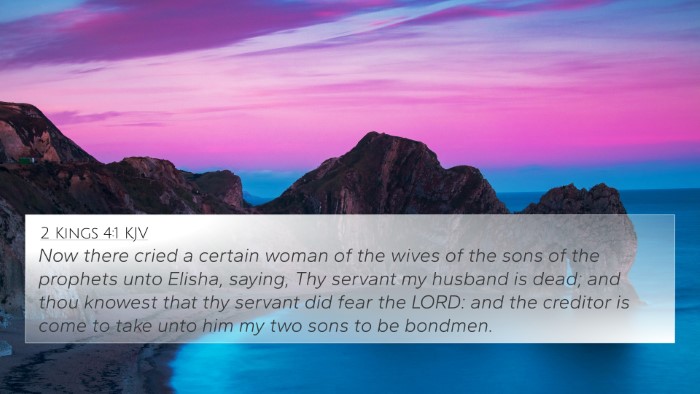
2 Kings 4:1 (KJV) »
Now there cried a certain woman of the wives of the sons of the prophets unto Elisha, saying, Thy servant my husband is dead; and thou knowest that thy servant did fear the LORD: and the creditor is come to take unto him my two sons to be bondmen.
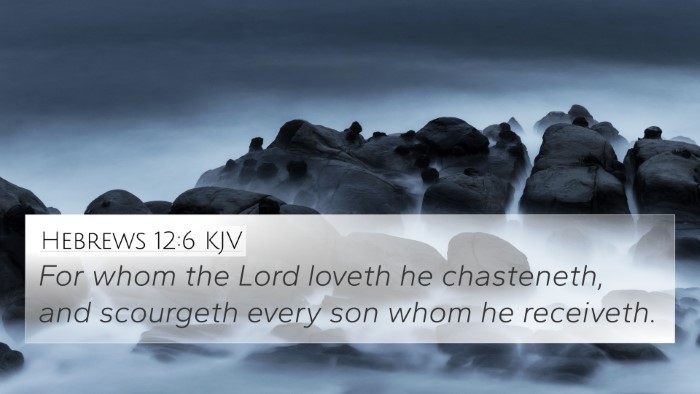
Hebrews 12:6 (KJV) »
For whom the Lord loveth he chasteneth, and scourgeth every son whom he receiveth.
Ruth 1:3 Verse Analysis and Similar Verses
Bible Verse: Ruth 1:3
"And Elimelech, Naomi's husband, died; and she was left, and her two sons."
Overview and Context
Ruth 1:3 marks a significant turning point in the narrative of the Book of Ruth, introducing themes of loss, commitment, and divine providence. In this verse, we witness the death of Elimelech, which leads to Naomi's shift from a life of stability in Bethlehem to a harrowing struggle in Moab. Each element of this verse carries deeper meanings as it unfolds the story of God’s faithfulness amid adversity.
Insights from Commentaries
-
Matthew Henry:
Henry emphasizes the sovereignty of God in times of trial and affliction. The death of Elimelech serves to illustrate how human events unfold within the divine plan. He notes that Elimelech’s departure to Moab was a step of disobedience, reflecting a failure to trust in God’s provision during a famine in Bethlehem.
-
Albert Barnes:
Barnes points out that the sorrow of Naomi after losing her husband is indicative of the emotional and spiritual struggles many face. He stresses the importance of community and support within the family unit, especially during times of grief. The mention of Naomi being left with her two sons sets the stage for the ensuing narrative about loyalty and redemption.
-
Adam Clarke:
Clarke provides a historical context, indicating that Elimelech’s migration to Moab was not merely famine-driven but also reflective of the socio-political situation of the Israelites. He draws attention to the cultural implications of intermarriage with Moabites, which later forms a crucial point in the narrative’s development.
Thematic Connections
This verse connects significantly with several themes found throughout Scripture:
- God's Providence: The unfolding events are rooted in God's overarching plan, as emphasized in Proverbs 16:9 and Romans 8:28.
- The Concept of Loss: Similar themes can be identified in Job 1:21 and 2 Corinthians 1:5, exploring the depth of loss and the comfort from God.
- Family and Loyalty: The loyalty demonstrated by Ruth in later verses mirrors the loyalty God shows to His people, as seen in Ephesians 1:5.
- Redemption: The story of Ruth leads to concepts of redemption and love, analyzing God's redemptive plan through Christ found in Galatians 4:5.
- The Role of Women: Naomi's resilience demonstrates the strength of women in the Bible, corresponding with Proverbs 31:10-31.
- Separation from the Community of Faith: Elimelech’s choice to leave Bethlehem foreshadows consequences of straying from the fold, as seen in 1 Peter 5:8.
- Cross-Generational Impact: Naomi’s experience influences Ruth, which can be paralleled with 2 Timothy 1:5 regarding the faith handed down through generations.
Cross-References
Understanding Ruth 1:3 through cross-references enriches its meaning. Here are some relevant verses:
- Proverbs 16:9: "The heart of man plans his way, but the Lord establishes his steps."
- Romans 8:28: "And we know that in all things God works for the good of those who love him, who have been called according to his purpose."
- Job 1:21: "The Lord gave, and the Lord has taken away; blessed be the name of the Lord."
- 2 Corinthians 1:5: "For just as we share abundantly in the sufferings of Christ, so also our comfort abounds through Christ."
- Ephesians 1:5: "In love, he predestined us for adoption to sonship through Jesus Christ, in accordance with his pleasure and will."
- Proverbs 31:10-31: "A wife of noble character who can find? She is worth far more than rubies."
- 1 Peter 5:8: "Be alert and of sober mind. Your enemy the devil prowls around like a roaring lion looking for someone to devour."
- 2 Timothy 1:5: "I am reminded of your sincere faith, which first lived in your grandmother Lois and in your mother Eunice and, I am persuaded, now lives in you also."
Conclusion
Ruth 1:3 offers a profound glimpse into the lives of its characters and sets the stage for themes of loss, loyalty, and divine providence. By engaging in cross-referencing Biblical texts, we can see the interconnectedness of God’s Word and how these themes resonate throughout Scripture.
Utilizing tools for Bible cross-referencing like a Bible concordance or cross-reference guide can deepen one's understanding of scriptural narratives and the continuity of God’s message across different books of the Bible.
